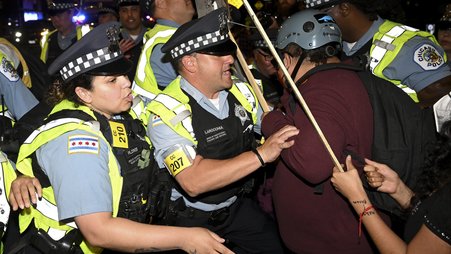
Federal courts used technology to conduct civil trials remotely during the pandemic, as in this virtual civil trial in the Middle District of Florida.
When the first civil trial over the Flint water crisis began in February 2022, the COVID-19 pandemic meant that the federal court in Michigan couldn’t let everyone who wanted to attend in the door. The case was important both locally and nationally: Four children exposed to lead in the drinking water had sued two engineering firms, accusing them of failing to conduct critical testing and treatment. But how could journalists and the public watch the trial, when social distancing requirements barred many of them from the courthouse?
Thankfully, the Judicial Conference — a policymaking body for federal courts — had made an exception to their long-standing ban on broadcasting court proceedings early in the pandemic. The exception allowed judges, including for the Michigan court, to use technology to allow the public to access both criminal and civil cases remotely. Reporters used that remote access to cover the entire Flint water trial, which ended with a deadlocked jury.
Letting the press and the public observe court proceedings from afar became commonplace during the pandemic. The public watched as former Police Officer Derek Chauvin was convicted of murdering George Floyd. It listened to a failed attempt by the Trump campaign to overturn the election results in Pennsylvania. It even heard someone — potentially a Supreme Court Justice — flush a toilet during oral arguments. (More importantly, it also heard live audio of oral arguments in numerous groundbreaking cases.)
Now that the pandemic has ended, however, that remote access is starting to be rolled back. The ability for judges to broadcast criminal proceedings in federal court, which had been authorized by statute, ended on May 10. The authority to provide remote audio access to civil and bankruptcy proceedings, which was established by a Judicial Conference policy, is set to expire on September 21.
According to news reports, the Judicial Conference will consider a new policy in September that would maintain remote public audio access for civil and bankruptcy cases. However, unlike during the pandemic, remote audio access would be allowed only in proceedings that don’t have witness testimony.
There’s no reason for the Judicial Conference to take this half-measure. Experience from the pandemic shows that it’s possible to provide remote public audio access to witness testimony, and that the public and the press benefit from that access. In the Flint water trial, for example, news outlets repeatedly reported about newsworthy witness testimony that they only had access to because they could listen to it remotely.
That’s why a coalition of 33 civil society and news media organizations, led by Freedom of the Press Foundation (FPF) and judicial watchdog group Fix the Court, has urged the Judicial Conference to adopt a new policy that continues to permit remote public audio access to civil and bankruptcy proceedings, including those in which a witness testifies. Our full letter to the Judicial Conference is below.
Simply put, the Judicial Conference shouldn’t reverse pandemic-era changes that made it possible for more members of the public and more journalists to listen to trials. Most people can’t go to newsworthy trials in person, especially if they don’t live near the courthouse. Remote audio access opens up court proceedings worldwide, so anyone who’s interested can listen in. These advances in technology allow for greater public access and should be embraced, not limited.
Of course, we also have the technology to provide even better access to court proceedings through video broadcasts. Because the Judicial Conference isn’t considering video broadcasts at its September meeting, the coalition letter doesn’t address that issue. But in FPF’s view, courts at all levels, from the Supreme Court on down, should give the public full video and audio access to all proceedings.
However, until cameras are finally allowed in courtrooms, remote public audio access is the next best thing. The pandemic proved that federal courts can offer remote public audio access to court proceedings, including witness testimony. It showed that journalists use this access to inform the public. Let’s not end or change a policy that’s provided so much benefit to the press and the public just because a terrible public health emergency is over.



